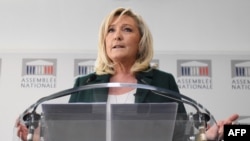She talks feminism and political unity. Commits to protecting the environment, and reforming rather than leaving the European Union and euro single currency.
Far-right, anti-immigrant, anti-globalization leader Marine Le Pen and her main opposition National Rally party have long been durable fixtures on France's political landscape. Scoring strongly in elections, but never strong enough.
But today, the French are seeing a kinder, gentler iteration of Le Pen — to the point the country's hardline interior minister Gerald Darmanin scoffingly called her "soft" on radical Islam.
Anger and sometimes downright rebellion are growing over the centrist government's handling of the COVID-19 pandemic. So, too, is broader voter disenchantment, and questions about whether a "front" against extremism that existed two decades ago could still hold today.
Could this confluence of factors finally make 2022 — when the next presidential vote takes place — Le Pen's year?
Many French appear to think so. A recent Elabe survey published by BFMTV finds nearly half of those polled believe Le Pen will win the next elections. Other polls suggest she could win between 47-48 percent of the vote — well ahead of Le Pen's nearly 34 percent score in the 2017 runoff against centrist President Emmanuel Macron.
"The more Marine Le Pen has a soft image, the more she takes on themes of openness and modernity, there's a likelihood voters will be attracted to her in the short term," said Christele Lagier, a far-right expert from the University of Avignon in southern France. "It's also been years since she's been in politics, so she's become a familiar, less threatening face."
Still, polling intentions today may not necessarily translate into reality next year. Le Pen and her party face sizable hurdles, Lagier and other analysts say, from their lack of competency on key issues like the economy, to their political isolation, making it difficult to strike needed alliances to win elections. And despite a half-century in politics, the party's local support base is patchy.
Mainstream rhetoric
Le Pen herself is balancing new taglines and proposals with her old combative style. A trained lawyer, she began revamping the party's image soon after taking over leadership a decade ago from her pugnacious father, Jean-Marie Le Pen.
In 2018, supporters overwhelmingly voted for changing the onetime National Front to the seemingly more embracing National Rally. Out went exiting the European Union and euro currency — staples of the National Front's discourse — in favor of reforming them.
In rhetoric, at least, she has tacked even further leftwards in recent months. In February, Le Pen announced a new interactive platform — M l'Avenir, or M Future — pegged as getting citizen buy-in to her presidential program. The name appeared to be a close spinoff to the moniker of an environmental association launched by former Socialist presidential candidate Segolene Royal.
Le Pen also calls for an alternative to the government's environmental plan, instead suggesting a referendum that includes more than a dozen green proposals. "Ecology is not a sad science," Le Pen said, but rather one supporting French well-being.
The questions, however, reflect Le Pen's own environmental philosophy, favoring nuclear over wind energy, for example. That goes against not only Macron's promises to slowly phase down nuclear's sizable energy footprint, but that of the Green's party which surged in local elections last year — while the National Rally fared only middling, despite capturing the southern city of Perpignan.
Meanwhile, Macron and his centrist Republic on the Move, or LREM party, are increasingly tacking to the right, with tough-on-crime rhetoric and recent legislation against separatism that many consider mostly targeting radical Islam. While analyst Lagier believes that could siphon off potential National Rally voters, others believe the opposite could happen.
"We see Macron is trying to establish a certain legitimacy as tough," said University of Tours political scientist Sylvain Crepon. "But we've seen it before — each time a party tries to take a page from the National Rally, it profits the National Rally."
Yet Le Pen and her party are also walking a tightrope, Crepon believes.
"If they become too radical, they become marginalized," he said. "But if they get too soft, they become banal."
Crumbling front
In Le Pen's favor is voter anger over the government's handling of the pandemic, marked by mixed messages on issues like masks and coronavirus restrictions, along with a slow vaccination rollout.
"The fact Macron's government is perceived as fairly incompetent in handling the coronavirus crisis could work in Le Pen and the National Rally's favor," Crepon said. "People could say they couldn't do any worse than what's already been done."
More long-term perhaps, are fears that a one-time "Republican front" against extremism is crumbling. The French were shocked in 2002, when Le Pen's father placed second in the first round of elections against center-right President Jacques Chirac. Chirac won a second-round landslide with more than 82 percent, in a broader pushback against extremism.
But French politics are very different today. The 2017 elections saw an implosion of the traditional right and left parties, which are still struggling to reemerge, even as it catapulted Macron's new movement to power. The public mood has turned sour and fearful with the pandemic. And some political leaders say they will not tell their supporters how to vote, if there is another Le Pen-Macron runoff in 2022.
Meanwhile, Le Pen recently earned support from a tiny new party called Avenir Francais, or French Future. But it's unclear whether other right-wing politicians will join her call for an alliance of “'national forces” ahead of next year's elections — and whether it could make any difference.
"We increasingly have voters who are intermittent and volatile, and who also abstain quite regularly," Lagier said, adding, "it's really the candidate who experiences less voter abstention during the coming elections that we need to focus on."



